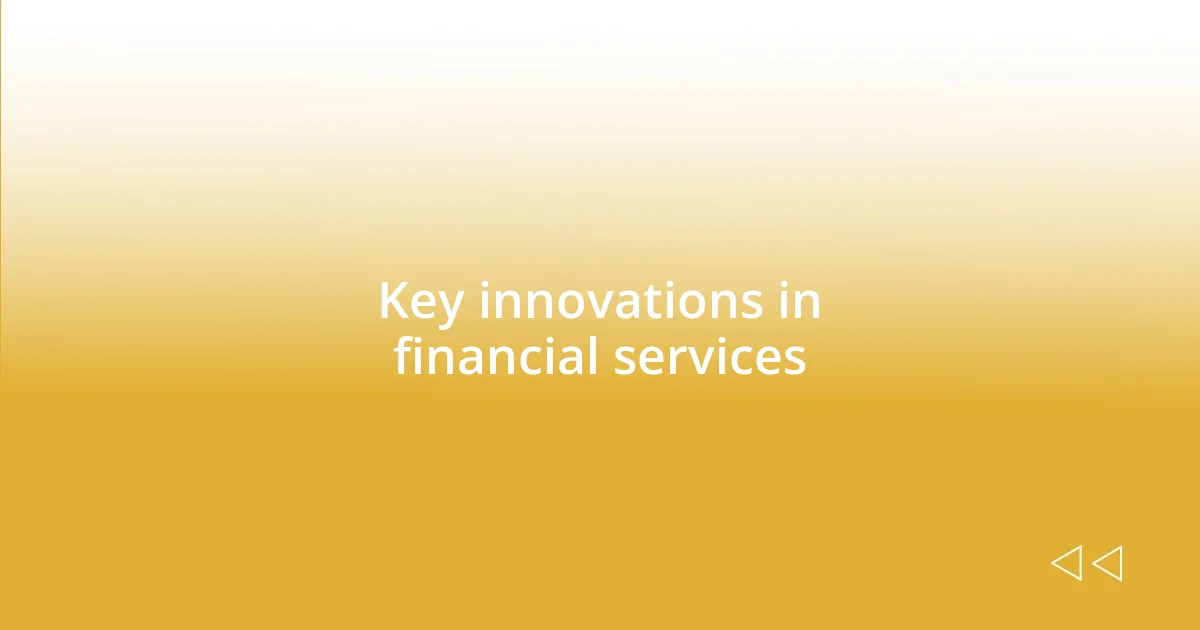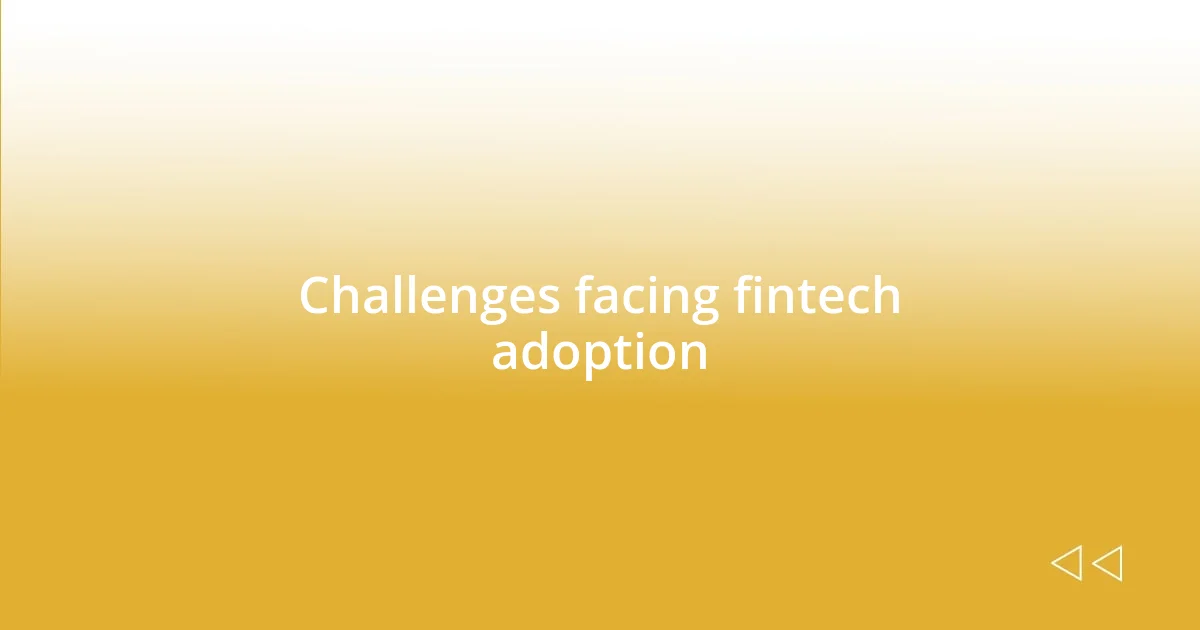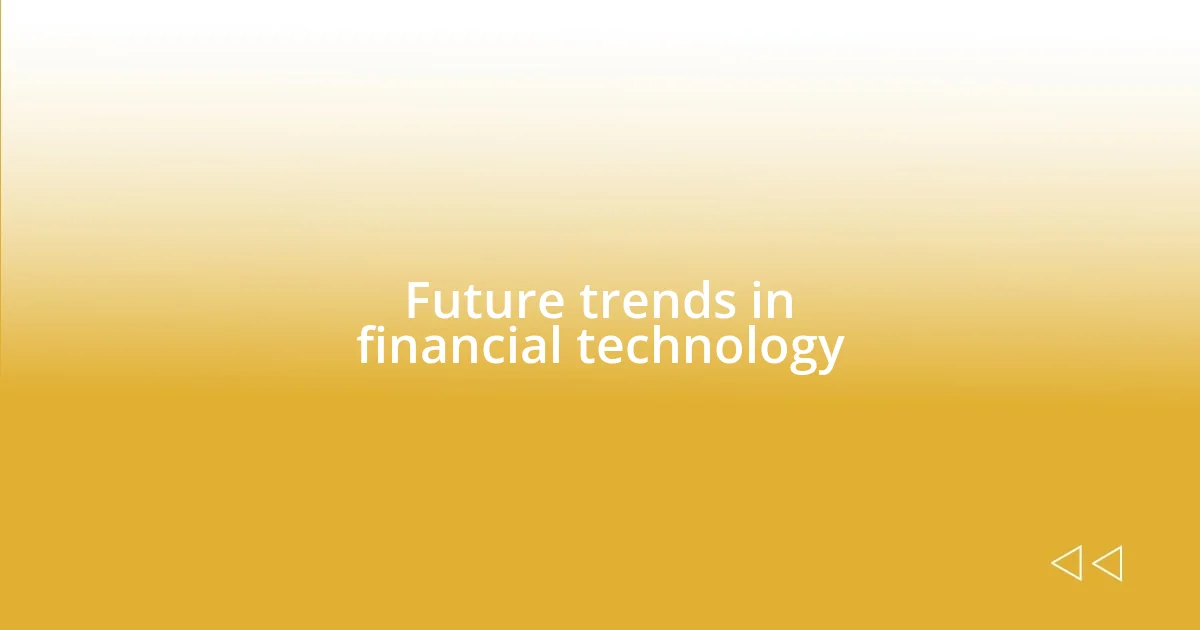Key takeaways:
- Fintech streamlines financial transactions and enhances security with technologies like biometric authentication.
- Innovations such as contactless payments, robo-advisors, and blockchain improve transaction speed, investment accessibility, and transparency.
- Challenges to fintech adoption include digital literacy gaps, regulatory compliance, trust issues, and cybersecurity concerns.

Understanding financial technology benefits
One of the most significant benefits of financial technology, or fintech, is its ability to streamline and simplify financial transactions. I still remember the first time I used a mobile banking app; the ease of transferring funds in just a few taps was astonishing. How many time-consuming trips to the bank could we save with just a little digital access at our fingertips?
Moreover, fintech often provides stronger security measures than traditional banking. I used to worry about my financial information being vulnerable, but with technologies like biometric authentication and encryption, those fears have lessened considerably. Doesn’t it feel reassuring to know that your sensitive data is better protected in our increasingly digital world?
Fintech also promotes financial inclusion, allowing those who previously lacked access to banking services to participate in the economy. I was moved when I learned about individuals in remote areas gaining access to loans through microfinancing apps. Isn’t it inspiring to think about how fintech opens doors that were once firmly closed? It’s more than just technology; it’s about empowering people and communities.

Key innovations in financial services
The evolution of payment technologies has arguably transformed the way we handle transactions. I still remember the first time I used contactless payments; it felt like a scene from a sci-fi movie, simply tapping my card instead of fumbling for cash. This shift not only saves time but elevates security by reducing the risk of theft associated with carrying physical money. Isn’t it fascinating how such a small innovation can greatly enhance our daily lives?
Another key innovation is the rise of robo-advisors. I recall my initial skepticism about letting algorithms manage my investments. However, after trying one, I was pleasantly surprised by the ease and efficiency of creating a diversified portfolio at a fraction of the cost compared to traditional financial advisors. The accessibility they offer allows even novice investors to get started on their financial journey without feeling overwhelmed.
Finally, blockchain technology is reshaping the foundations of financial transactions. When I first learned about it, the potential for increased transparency and security really struck me. Decentralization means that transactions are verified by a network rather than a single entity, which reduces the risk of fraud. How can you not get excited about a technology that could redefine trust in financial services?
| Innovation | Benefit |
|---|---|
| Contactless Payments | Faster transactions and improved security |
| Robo-Advisors | Affordable investment management and accessibility |
| Blockchain | Enhanced transparency and fraud reduction |

Challenges facing fintech adoption
It’s not all smooth sailing when it comes to adopting fintech solutions. One significant hurdle I’ve encountered is the lack of digital literacy among some users. I recall helping my parents navigate a budgeting app, which highlighted how intimidating technology can be for those who didn’t grow up with it. Understanding how to use these tools effectively is critical, and without proper education, many can feel left behind.
Additionally, regulatory compliance poses a significant challenge for fintech companies. This often means they operate in a constantly shifting environment, needing to adapt to new laws and regulations. I think about small businesses that would love to integrate fintech but are unsure if they can keep up with the requirements. Here are some key challenges:
- Digital Literacy: Many potential users lack the skills to effectively use fintech solutions.
- Regulatory Compliance: Changing regulations can hinder innovation and create uncertainty for businesses.
- Trust Issues: Some consumers remain skeptical about the security and reliability of fintech platforms.
- Security Concerns: Cybersecurity threats continue to loom large, making users hesitant to adopt new technologies.

Future trends in financial technology
I see some exciting potential in how artificial intelligence (AI) and machine learning are set to transform financial technology. Picture this: I was recently at a fintech seminar where experts discussed personalized financial services driven by AI. It struck me that soon, our banking experiences will be tailored to our habits, spending behaviors, and even moods. Isn’t it incredible to think that our financial decisions could be guided by intelligent algorithms that learn from us?
Another area I find particularly captivating is the rise of decentralized finance (DeFi). I used to think of finance as centralized and controlled by major institutions, but participating in a few DeFi platforms opened my eyes to a world where I could access financial services independently. This shift could democratize access to lending and investment opportunities, removing barriers and fostering innovation. Have you ever imagined being your own bank?
Finally, the integration of financial services into everyday applications—what we call embedded finance—is taking things to the next level. I once booked a holiday online and used a built-in payment option that allowed me to finance my trip all within one platform. It felt seamless and efficient, but more importantly, it signals that financial transactions will become even more integrated into our daily lives. Who wouldn’t appreciate the convenience of handling everything in one place?















